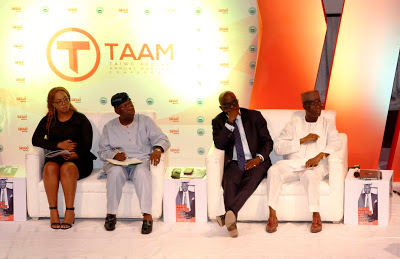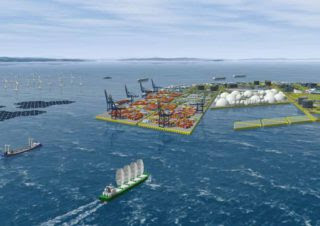Dr. Taiwo Afolabi, Group Executive
Vice Chairman, SIFAX Group, a multinational corporation with diverse interests
in Maritime, Aviation, Haulage & Logistics, Oil & Gas and Hospitality,
and other maritime experts have proffered solutions to address the challenge of
rising port costs.
Vice Chairman, SIFAX Group, a multinational corporation with diverse interests
in Maritime, Aviation, Haulage & Logistics, Oil & Gas and Hospitality,
and other maritime experts have proffered solutions to address the challenge of
rising port costs.
These solutions were identified at
the third edition of the Taiwo Afolabi Annual Maritime Conference which was held in honour of Dr.
Taiwo Afolabi, Group Executive Vice-Chairman, SIFAX Group, in collaboration
with The Maritime Forum, University of Lagos and SIFAX Group.
the third edition of the Taiwo Afolabi Annual Maritime Conference which was held in honour of Dr.
Taiwo Afolabi, Group Executive Vice-Chairman, SIFAX Group, in collaboration
with The Maritime Forum, University of Lagos and SIFAX Group.
Otunba Kunle Folarin, Chairman, Nigerian Ports
Consultative Council, who delivered the keynote address titled: Port Costs and
Port Charges: Issues in the Port Reform Policy” noted that a typical shipping
company debit note in Nigeria contains nine different charges which includes-
shipping line/agencies charge, container cleaning/maintenance, container
deposit, MOWCA charge, NIMASA sea protection levy, MOWCA Fee, freight levy,
document release, demurrage charges, NIPOST Stamp Tax and Value Added Tax
(VAT).
Consultative Council, who delivered the keynote address titled: Port Costs and
Port Charges: Issues in the Port Reform Policy” noted that a typical shipping
company debit note in Nigeria contains nine different charges which includes-
shipping line/agencies charge, container cleaning/maintenance, container
deposit, MOWCA charge, NIMASA sea protection levy, MOWCA Fee, freight levy,
document release, demurrage charges, NIPOST Stamp Tax and Value Added Tax
(VAT).
He further explained that disputed charges between the Nigerian Ports
Authority and shipping companies include- provision billing, under declaration
of weight and volume, excessive extra service charges between NPA and Terminal
operators, throughput charges, royalty, lease fees, use of foreign currency in
computing charges, berthing fees.
Authority and shipping companies include- provision billing, under declaration
of weight and volume, excessive extra service charges between NPA and Terminal
operators, throughput charges, royalty, lease fees, use of foreign currency in
computing charges, berthing fees.
To curb the effects of these charges on the
port system, Folarin submitted that there must be a deliberate government
policy to reduce Customs duties and taxes and that the revenue target placed on the Nigerian
Customs Service Commands should be discontinued to reduce port cost and charges, the setting up of an
effective and efficient single window platform and regulation of the port and
shipping sector to include both service and costs, port infrastructure
development especially in port environment and common user areas.
port system, Folarin submitted that there must be a deliberate government
policy to reduce Customs duties and taxes and that the revenue target placed on the Nigerian
Customs Service Commands should be discontinued to reduce port cost and charges, the setting up of an
effective and efficient single window platform and regulation of the port and
shipping sector to include both service and costs, port infrastructure
development especially in port environment and common user areas.
He also advocated the establishment of a port
community system as a framework for stakeholder dialogue to improve service
quality and reduce costs and the encouragement of Public-Private partnership in
port business, investment in modern facilities and IT enablers and provision of
good quality human services.
community system as a framework for stakeholder dialogue to improve service
quality and reduce costs and the encouragement of Public-Private partnership in
port business, investment in modern facilities and IT enablers and provision of
good quality human services.
“The issue of rising port costs and charges
which has soared unabatedly can be solved if political will which includes the
implementation of all agreed process and terms without delay and transparency
is entrenched. The landlord model must be administered in the very technical,
ethical and objective structure such that concessionaires obligations are not
to replace the responsibilities of the port authority and including an
inclusive port reform strategy.
which has soared unabatedly can be solved if political will which includes the
implementation of all agreed process and terms without delay and transparency
is entrenched. The landlord model must be administered in the very technical,
ethical and objective structure such that concessionaires obligations are not
to replace the responsibilities of the port authority and including an
inclusive port reform strategy.
In his opening remarks, Chief Adebayo Sarumi,
former Managing Director of NPA and the Chairman of the occasion, explained
that the regulatory agencies should formulate policies that will be beneficial
to every player in the maritime sector.
former Managing Director of NPA and the Chairman of the occasion, explained
that the regulatory agencies should formulate policies that will be beneficial
to every player in the maritime sector.
He said: “To curb the rising port costs and
charges, operators
should determine appropriate cost of services in the maritime sector. This is
because at present, terminal operators are going through a tough time meeting
up with their lessee obligation due to a volatile exchange rate order between
the Naira and the Dollars. The private sector should be allowed to run the port
because the government is not adequately equipped to run it.”
charges, operators
should determine appropriate cost of services in the maritime sector. This is
because at present, terminal operators are going through a tough time meeting
up with their lessee obligation due to a volatile exchange rate order between
the Naira and the Dollars. The private sector should be allowed to run the port
because the government is not adequately equipped to run it.”
Dr. Taiwo Afolabi, Group Executive
Vice Chairman, SIFAX Group, in his own speech highlighted that there is a need
for the regulatory authorities to harmonise and balance the conflicting
viewpoints in order to satisfy all who do business in the maritime sector.
Vice Chairman, SIFAX Group, in his own speech highlighted that there is a need
for the regulatory authorities to harmonise and balance the conflicting
viewpoints in order to satisfy all who do business in the maritime sector.
“I am
very hopeful that the a suitable framework for determining the appropriate
costs of services in the Nigerian port system will be developed very soon
without making our ports unfriendly to users either internally or within the
sub-region,” he said.
very hopeful that the a suitable framework for determining the appropriate
costs of services in the Nigerian port system will be developed very soon
without making our ports unfriendly to users either internally or within the
sub-region,” he said.


































































